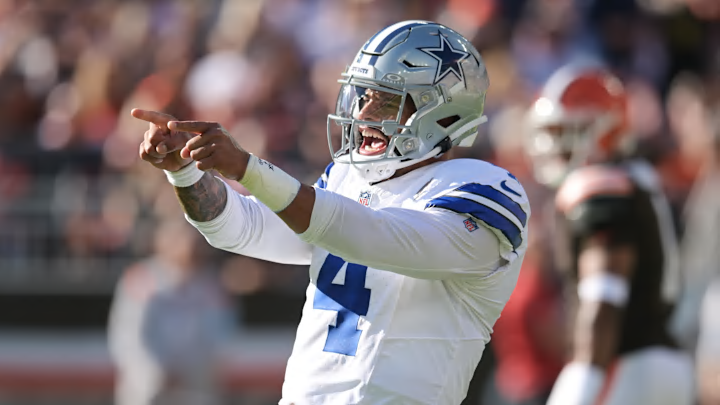Dak Prescott Won His Negotiation With the Cowboys Again

In my careers around the NFL—agent, team executive, media analyst—I have felt a counterintuitiveness about what’s considered the “busy time” of year. Unlike players, coaches and most media, in-season is the offseason for the business of the NFL. Every year, when the season’s opening kickoff happens, I let out an audible exhale; the bulk of my work is done.
The Dallas Cowboys took that timing extremely literally Sunday, finishing up their offseason business just hours before their opening kickoff against the Cleveland Browns. And what a business it was, rewarding their quarterback with an eye-popping contract at the top of the pay scale for the second time in three years. Let’s examine.
Another business win for Dak
This is not the first time that Dak Prescott “won” the negotiating game over the Cowboys. Just three short years ago, coming off a gruesome foot injury while playing under a franchise tag, Prescott negotiated a top-of-market four-year, $160 million contract. And the most prominent feature of that deal, as I wrote at the time, was not the $40 million average but rather the shortest length (four years) of any of the top quarterback contracts being done at the time or since. For a premium position such as quarterback, the more chances at another negotiation the better. It created massive leverage for Prescott, requiring the Cowboys to come back to the bargaining table within three years. And they did.
I knew Prescott would ask for a contract average starting with a six, and that the Cowboys were certainly willing to break the seal on the $55 million average that other top quarterbacks had negotiated but were resisting jumping to a $60 million plateau. Until, of course, they stopped resisting, as the emotion of the owner got the best of them again.
Prescott now becomes the highest-paid quarterback in cash flow in all years of the deal. With a stunning $80 million signing bonus, his first-year cash flow is $81.25 million, topping Jared Goff’s $80.6 million. His two-year cash flow of $129 million far exceeds Lamar Jackson and Joe Burrow, who are tied at $111 million. His three-year cash flow of $169 million tops the trio of Jackson ($155 million), Goff ($153 million) and Patrick Mahomes ($152 million). His four-year cash flow of $214 million beats Jackson ($207 million) and Mahomes ($205 million). And, as a cherry on top, the contract prohibits the Cowboys from applying the franchise tag after its expiration (as the previous contract did). Simply put, this is a stunning contract.
Cowboys’ vantage point
In analyzing this contract, we are left with the question: “What did Jerry Jones and the Cowboys get (besides, of course, having Prescott under contract for the next five seasons)?” Well, there is this: They avoided the rock-solid, true, “guaranteed at signing” guarantees that defined the Deshaun Watson contract in 2022 and have been absent from every other quarterback contract since. Yes, I know Prescott’s agent has touted that there are $231 million in guarantees, but there is “only” $129 million guaranteed at signing. In other words, $101 million of the guarantees have contingencies, meaning Prescott must be on the roster at dates in ’25, ’26 and ’27 to trigger those dollars. The Cowboys do not have to fund future guarantees with contingencies; thus, the popularity with teams despite resistance from agents. All teams and their owners, including the Cowboys and Jones, have made sure that the Watson contract, with the entire contract “guaranteed at signing,” is not a precedent but rather an aberration that somehow slipped through the cracks. I will dive deeper into the Watson contract and any possibility that the Browns can exit it (don’t hold your breath) in a future column.
Back when I was negotiating contracts for the Green Bay Packers, I always tried to be proactive to get in front of the rising market, an opposite approach to the one taken by the Cowboys. I am trying to put myself in their shoes and figure out their way of operating. Perhaps they want to hold the commitment as long as possible in case something should happen—injury, misconduct, etc.—that would affect the contract. Perhaps they want to hold the money as long as possible in their account before paying it out to the players’ account when absolutely necessary. Perhaps there is some other reason that I am not aware of. In any case, it is a playbook that agents are familiar with, and we should expect the same for Micah Parsons a year from now.
Lessons learned
There are two lessons on player contract negotiations that I cannot stress enough. While many debate the relative strengths and weaknesses of Prescott as a player, negotiators are not debating “who’s better” between Prescott and other quarterbacks with recent contracts, such as Burrow, Justin Herbert, Trevor Lawrence, Jordan Love, etc. Contract negotiations are about two things: marketplace and timing, and Prescott played the game with those factors extremely well.
Speaking of timing, Prescott signed a short deal in 2021, and the market has risen exponentially every year. Prescott has taken advantage of that twice while other top young quarterbacks—Mahomes, Josh Allen, Burrow, Lawrence and Herbert to name a few—have been and will be stuck on deals done when the marketplace was dramatically lower than it is now. Prescott’s career earnings will zoom past those players. Again, it’s not about “how good,” it’s about “how shrewd.”
Dak did it again. He is a future first-ballot Business of Football Hall of Famer. Indeed, at some point, he may have a wing named after him.
